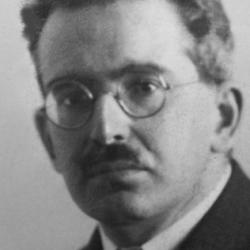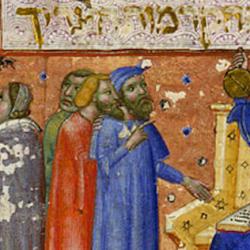In a 2006 article in Past & Present, Jonathan Sheehan traces the origins of the modern contrast of sacred and profane to seventeenth-century dispute about idolatry. It’s a story of keen interest, but this particularly caught my eye. He’s talking about the role of the golden calf incident in 17th-century debates about idolatry, and writes:
“If Aaron’s errors testified to the poisonous effects of idolatry on the mind of the credulous, Jeroboam’s fall testified to its poisonous effects on the political life of the nation. This was particularly appropriate in the seventeenth century. Where the sixteenth century had operated largely within the rhetoric of heresy and schism (implying that Christian unity might return, whether by violence or by reconciliation), by 1600 the diversity of Christian churches was a stubborn feature of the political and religious landscape. Like Israel and Judah long before, the tribes of Europe were permanently divided. The seventeenthcentury obsession with Jewish idolatry thus had a compelling logic in the light of the new immobility of Europe’s religious division: Jeroboam’s deviance resonated with a period when, perplexingly, the love of God was shared by all, but the ways to show this love had become fiendishly divisive. And so, Calvinists repeatedly noted that Jeroboam’s love of God did nothing to exonerate his idolatrous behaviour. The anonymous author of the Originall of Popish Idolatrie described how Jeroboam ‘instituted strange Priests, corrupted the Law of God’ and began an ‘Idolatrie and corruption of sacrifices’ that continued for ‘more then [sic] foure hundred yeers.’ Grotius offered a typically laconic comment — that ‘princes are accustomed to twisting sacred matters to their ends’ — but declared it God’s will that Jeroboam, like the Pharaoh, ‘might be hardened more and more in his idolatry’” (45).
Jeroboam’s is ultimately a cautionary tale: “Jeroboam loved Jehovah enough to demolish the impious Solomonic state and Aaron carried this love throughout his priestly life. Nonetheless, both Aaron and Jeroboam were indisputably and finally guilty of idol worship. The monotheistic, yet backsliding, Jews thus repeatedly showed that belief in God in no way ensured orthopraxis” (46).
Sheehan, “Sacred and Profane: Idolatry, Antiquarianism and the Polemics of Distinction in the Seventeenth Century,” P&P 192 (2006) 35-66.














